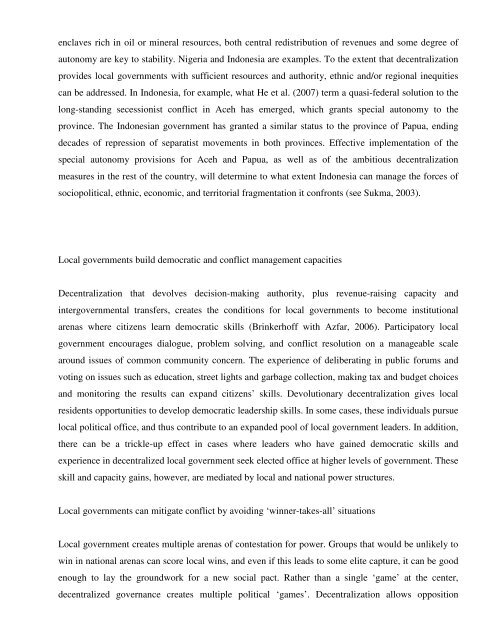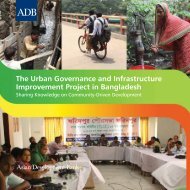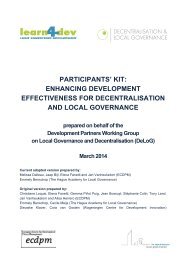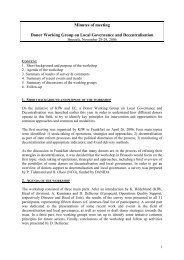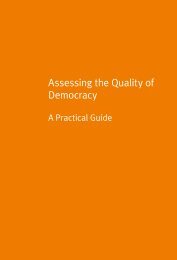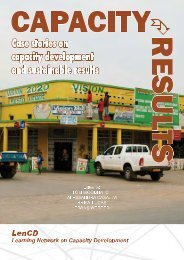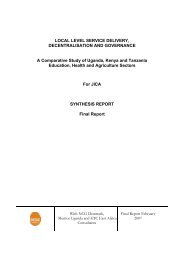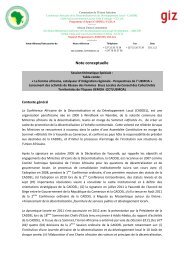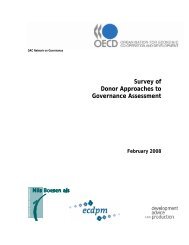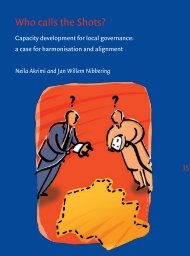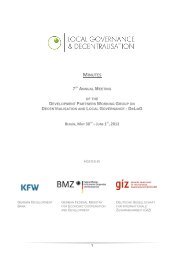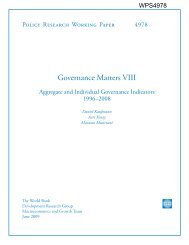Decentralized Local Governance In Fragile States ... - DeLoG
Decentralized Local Governance In Fragile States ... - DeLoG
Decentralized Local Governance In Fragile States ... - DeLoG
You also want an ePaper? Increase the reach of your titles
YUMPU automatically turns print PDFs into web optimized ePapers that Google loves.
enclaves rich in oil or mineral resources, both central redistribution of revenues and some degree ofautonomy are key to stability. Nigeria and <strong>In</strong>donesia are examples. To the extent that decentralizationprovides local governments with sufficient resources and authority, ethnic and/or regional inequitiescan be addressed. <strong>In</strong> <strong>In</strong>donesia, for example, what He et al. (2007) term a quasi-federal solution to thelong-standing secessionist conflict in Aceh has emerged, which grants special autonomy to theprovince. The <strong>In</strong>donesian government has granted a similar status to the province of Papua, endingdecades of repression of separatist movements in both provinces. Effective implementation of thespecial autonomy provisions for Aceh and Papua, as well as of the ambitious decentralizationmeasures in the rest of the country, will determine to what extent <strong>In</strong>donesia can manage the forces ofsociopolitical, ethnic, economic, and territorial fragmentation it confronts (see Sukma, 2003).<strong>Local</strong> governments build democratic and conflict management capacitiesDecentralization that devolves decision-making authority, plus revenue-raising capacity andintergovernmental transfers, creates the conditions for local governments to become institutionalarenas where citizens learn democratic skills (Brinkerhoff with Azfar, 2006). Participatory localgovernment encourages dialogue, problem solving, and conflict resolution on a manageable scalearound issues of common community concern. The experience of deliberating in public forums andvoting on issues such as education, street lights and garbage collection, making tax and budget choicesand monitoring the results can expand citizens’ skills. Devolutionary decentralization gives localresidents opportunities to develop democratic leadership skills. <strong>In</strong> some cases, these individuals pursuelocal political office, and thus contribute to an expanded pool of local government leaders. <strong>In</strong> addition,there can be a trickle-up effect in cases where leaders who have gained democratic skills andexperience in decentralized local government seek elected office at higher levels of government. Theseskill and capacity gains, however, are mediated by local and national power structures.<strong>Local</strong> governments can mitigate conflict by avoiding ‘winner-takes-all’ situations<strong>Local</strong> government creates multiple arenas of contestation for power. Groups that would be unlikely towin in national arenas can score local wins, and even if this leads to some elite capture, it can be goodenough to lay the groundwork for a new social pact. Rather than a single ‘game’ at the center,decentralized governance creates multiple political ‘games’. Decentralization allows opposition


